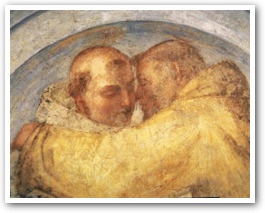Discouragement
- FATHER GEORGE W. RUTLER
Our Lord encourages each of us: do not be disheartened.
 In the liturgical readings these days, as in much of the past summer, our Lord teaches through parables. Since there are twenty-four of them, it would be possible to spend almost half of all the Sundays of the year preaching on the parables alone. Unlike stories told by mortal men using plots and images to reach up to lofty heights, our Lord uses parables to reach down from the heights of heaven itself. After all, he came down from and knows all about it, because that is his home, and in this world he had no permanent dwelling place. Our stories about heaven are speculation; his are information.
In the liturgical readings these days, as in much of the past summer, our Lord teaches through parables. Since there are twenty-four of them, it would be possible to spend almost half of all the Sundays of the year preaching on the parables alone. Unlike stories told by mortal men using plots and images to reach up to lofty heights, our Lord uses parables to reach down from the heights of heaven itself. After all, he came down from and knows all about it, because that is his home, and in this world he had no permanent dwelling place. Our stories about heaven are speculation; his are information.
As Christ knows the heights, in a system of contradictions he likewise knows the depths. He knows the ways of Satan better than we do, just as Satan knows the ways of God better than we know them, and Jesus tells parable after parable to encourage us, because he knows that the essential strategy of Satan is to discourage. Now, to discourage is to remove the heart. And Satan wants us to lose heart in order to make us share in his heartlessness.
There are times in the human annals, and in every individual life, when men and their methods face discouragement. So it was in the fourteenth century when the Scots set out on crusade to rescue the Holy Sepulchre from the Moors. Robert the Bruce, declared the legitimate king of Scotland by Pope John XXII, had died in 1329 asking that his embalmed heart be carried with the army to the Church of the Holy Sepulchre. Sir James Douglas carried the heart with his troops on the journey to Jerusalem, in a silver and enameled box hung around his neck. In Granada, Douglas encouraged the troops by flinging the heart ahead of them and, according to one version, shouting: "Now pass thou onward as thou wert wont, and Douglas will follow thee or die." The army was defeated by the Muslim foe, but the heart of King Robert was found on the battlefield, along with the body of Douglas, and taken back to Scotland and buried under the high altar of Melrose Abbey.
The heart of Jesus is not embalmed and is never lost. He encourages his Church, in spite of the failings of her human members, both clergy and lay. In the parable of the Two Sons, one son promises to serve his father and does not, while the other refuses, but in the end does his father's bidding. The point is that cynical professions of intent fail, but those who are honest, even to the extent of saying they will not serve God, can channel that honesty into obedience. So our Lord encourages each of us: do not be disheartened. Try your best, but be honest. Saint John Vianney encouraged his own flock: "Not all the saints started well, but all of them ended well."
 This is Meaghen Gonzalez, Editor of CERC. I hope you appreciated this piece. We curate these articles especially for believers like you.
This is Meaghen Gonzalez, Editor of CERC. I hope you appreciated this piece. We curate these articles especially for believers like you.
Please show your appreciation by making a $3 donation. CERC is entirely reader supported.

Acknowledgement
Father George W. Rutler. "Discouragement." From the Pastor (September 28, 2014).
Reprinted with permission of Father George W. Rutler.
The Author
 Father George W. Rutler is the pastor of St. Michael's church in New York City. He has written many books, including: The Wit and Wisdom of Father George Rutler, The Stories of Hymns, Hints of Heaven: The Parables of Christ and What They Mean for You, Principalities and Powers: Spiritual Combat 1942-1943, Cloud of Witnesses — Dead People I Knew When They Were Alive, Coincidentally: Unserious Reflections on Trivial Connections, A Crisis of Saints: Essays on People and Principles, Brightest and Best, and Adam Danced: The Cross and the Seven Deadly Sins.
Father George W. Rutler is the pastor of St. Michael's church in New York City. He has written many books, including: The Wit and Wisdom of Father George Rutler, The Stories of Hymns, Hints of Heaven: The Parables of Christ and What They Mean for You, Principalities and Powers: Spiritual Combat 1942-1943, Cloud of Witnesses — Dead People I Knew When They Were Alive, Coincidentally: Unserious Reflections on Trivial Connections, A Crisis of Saints: Essays on People and Principles, Brightest and Best, and Adam Danced: The Cross and the Seven Deadly Sins.




